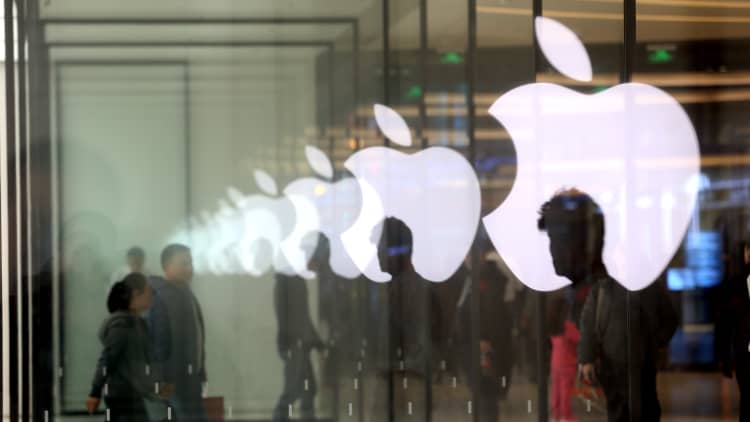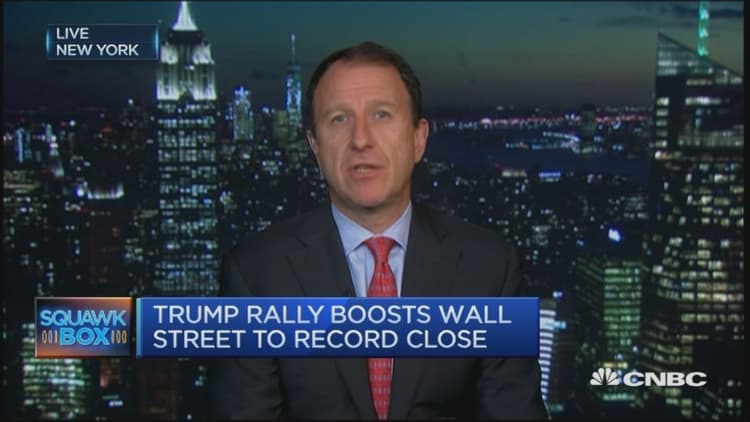
The White House is angling to get U.S. companies like Apple and to bring back the $1 trillion cash pile they have stashed overseas so they can invest in America.
Stock investors are hoping that same "repatriated" cash would be spent on shareholders in the form of dividends and share buybacks — just like when President George W. Bush gave multinationals a tax break in 2004.
But something that's also possible — and not much discussed — is that companies could bring home the cash, spruce up their balance sheets and pay down debt.
"We expect that to happen with a good portion of the cash. Ultimately, a lot of this money has really been borrowed to finance dividends and share repurchases," said Jon Duensing, head of corporate credit at Amundi Smith Breeden. He said companies may hold onto some of that cash and use it to retire debt as different maturities come due, but a smaller group may even pay off debt before it is due.
"Certainly we as credit investors or lenders to companies would be concerned if companies paid out all that cash (in dividends, buybacks) and then we were left with all the debt and just the future cash flow
U.S. corporations have been tapping the corporate debt market at a record pace, as the era of super-low rates potentially hits its twilight phase. Apple, for instance, raised $7 billion in the debt market Thursday in a deal that was nearly three times oversubscribed, according to Informa Global Markets. That deal follows another $10 billion in February, and both were earmarked for share buybacks. Apple had about $84 billion in long-term debt, as of is last earnings filing.

"They've gone from zero debt" since April 2013, Duensing said, noting Apple's debt load is relatively small for the technology giant. What Apple has done with its debt proceeds is clear.
It's been a buyback "monster." Apple shares outstanding topped out in 2013 at about 6.6 billion. Since then, the number has declined every year and now stands at 5.2 billion.
"They went from being a technology company where
Duensing said there's an estimated $2.5 trillion to $3 trillion in offshore profits, but $1 trillion is considered liquid and invested in short-term holdings. That's the cash horde the market has focused on but ultimately more of the profits could be brought back, he said.
Peter Tchir, managing director, macro income strategy at Brean Capital, said he's been advising clients to buy the older debt of some of these multinationals. He said companies may find that they want to retire some of the older outstanding issues.
"They could manage some of their earnings around which bonds they retire. It would be natural as they pull some of the cash back, that they'd retire some of their debt," he said.
UBS equity strategist Julian Emanuel, in a recent report, analyzed the overseas profits and holdings of U.S. companies, based on their year-end filings.
"Our analysis uncovered more than $2.4 trillion of unremitted foreign earnings and more than $1.0 trillion of cash held offshore from our line item analysis of the annual filings. Indefinitely
reinvested foreign earnings grew by $185 billion over the past year," according to the report.
Of companies with the biggest cash piles, Apple topped the list, followed by Microsoft, Cisco,
"In general, I'm biased toward liking the big tech companies with a lot of offshore debt. I think their bonds are attractively priced with some upside," said Tchir.
How much of their overseas cash would be diverted to debt repayment is tough to gauge.
"It depends on what the tax code looks like," said Tchir. "It could be a relatively small amount or a lot."
President Donald Trump would like a tax holiday, with some low rate, to lure the cash back into the U.S. and then future profits would be taxed at a new lower U.S. tax rate.
But the final shape of the corporate tax bill is far from clear, with the House of Representatives pushing its own plan. The current system where a U.S. company can defer the profits of a foreign subsidiary as long as they are invested overseas would likely go away.
There is one proposal that would have a huge impact on the corporate bond market and affect the behavior of not only multinationals but all indebted companies. There is a proposal to limit the
"I do think that people are overestimating the potential that this is going to be paid back in big dividend payments or buybacks. They also borrowed this money, using the offshore cash as collateral against it," said Tchir.
Companies may be in some way restricted from using the overseas funds to buy back
"The love affair with allowing people debt financing for their equity purchases or dividends has gone away. I think they'll be discouraged from that. I think there's a whole array on the table that ends up being much better for bond people," he said.
Duensing said technology and pharmaceutical bonds got a bid on the repatriation idea just after the election but that's since faded.
"It's really going to be dependent on how interest payments are treated and what the exact repatriation looks like," said Tchir.
Watch: Pro says markets counting on repatriation plans



